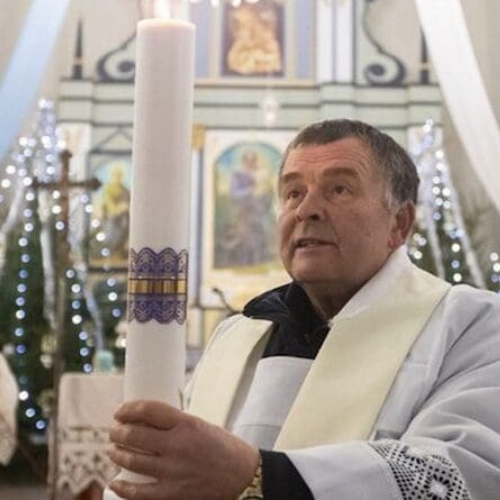On 1 April 2025, the Supreme Court of Belarus rejected Catholic priest Henryk Okolotovich’s appeal against his 11-year jail sentence on charges of treason. The trial and subsequent appeal were closed to the public, and Okolotovich, a 65-year-old parish priest from Volozhin, continues to deny the accusations against him. In a message from prison, he firmly rejected the charges of espionage for Poland and the Vatican, describing his trial as an attack on the Catholic Church in Belarus.
The Arrest and Charges
Fr. Henryk Okolotovich was arrested on 16 November 2023 and was detained in a KGB prison in Minsk. Initially, there were no clear reasons for his arrest, but it soon emerged that he was being investigated for treason under Belarus’s criminal code. The charges stemmed from the accusation that he had disclosed state secrets or assisted a foreign state or organization. The investigation, which was shrouded in secrecy, also involved the confiscation of money, religious icons, and other property from his parish.
Despite the serious nature of the charges, no concrete evidence was presented to support the claims. Okolotovich rejected all allegations of espionage and claimed that he was being persecuted simply because he spoke the truth, representing the Catholic Church in Belarus. The authorities apparently were not pleased with his steadfastness and dedication to his faith. He had been under surveillance for a long time, with undercover agents attending his Masses and monitoring his activities. According to reports, Fr. Okolotovich had never been involved in any criminal activities and had no personal reasons for such accusations.
F-16 Arrival Turns Explosive as Espionage Fears and Malfunctions Shake Bulgarian Air Base
The Trial and Conviction
In December 2024, after a closed trial, Okolotovich was sentenced to 11 years in prison and was required to pay a hefty financial penalty, estimated to be more than 3.5 million Belarusian roubles. The trial was closed to the public, and the reasons behind the enormous fine remain unclear. Local Catholics have suggested that the money seized from the priest and his parish might have been used to partly pay this fine.
The court proceedings were widely seen as politically motivated, with Okolotovich’s supporters claiming that the charges against him were fabricated. Throughout the investigation and trial, Fr. Okolotovich refused to implicate others, including the country’s Catholic bishops, despite intense pressure to do so. In his messages from prison, he described his trial as a way to silence the Catholic Church in Belarus and prevent it from revealing the truth.
After the court’s decision, Okolotovich lodged an appeal, but it was rejected by the Supreme Court on 1 April 2025. Following this, he was transferred to a labor camp in Bobruisk, where he began serving his sentence. Despite his ill health, the authorities refused to provide him with adequate medical care.
Chinese National Arrested in South Korean Military Espionage Case
Persecution of the Catholic Church in Belarus
Fr. Okolotovich’s case is not isolated. It highlights the increasing pressure on the Catholic Church in Belarus and its leaders. Religious persecution has been on the rise in the country, with authorities increasingly targeting clergy members and believers. The closure of religious trials, the confiscation of funds and property, and the severe punishments faced by those accused of “treason” or other charges are all part of a broader campaign against faith-based organizations in Belarus.
Fr. Okolotovich’s arrest and trial have drawn attention to the state’s efforts to control religious expression and silence dissent. Despite the growing concern over religious freedoms in Belarus, the authorities continue to impose strict surveillance and pressure on church leaders, with many fearing further repression.
The case of Fr. Okolotovich raises serious questions about the future of religious freedoms in Belarus, with many worrying that this could set a dangerous precedent for the treatment of religious leaders and communities in the country. As the government continues to crack down on any form of opposition, the Catholic Church stands at the forefront of resistance, often at great personal cost to its clergy.


